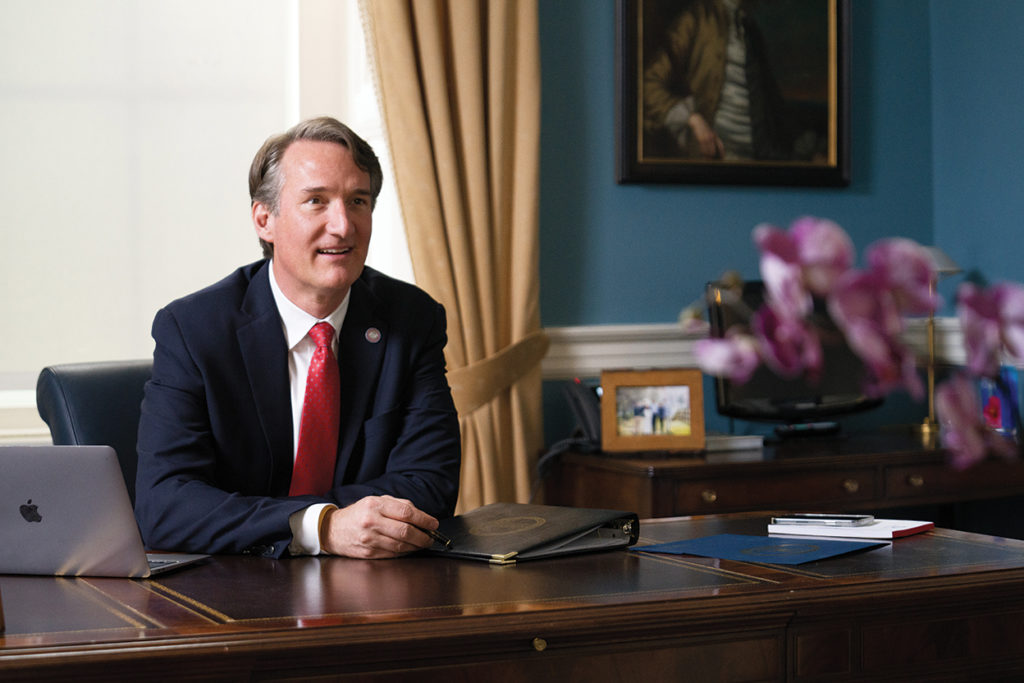Gov. Glenn Youngkin strives to bring Virginia together with private-sector approach to government
In the final days of 2021, Old Dominion University released its annual State of the Commonwealth Report.
The report, which is spearheaded by the Dragas Center for Economic Analysis and Policy at ODU, asserts that a continued shift of population and economic activity toward Virginia’s “urban crescent” – Northern Virginia, Richmond and Hampton Roads – coupled with political currents “suggest that the Commonwealth is pulling apart, creating a challenge for current and future decision makers on how to spur development in those areas of the state that have been left behind.”
The data compiled by the report’s authors illustrate how the shift in population and wealth are working to essentially create “two Virginias.” The population of the Washington-Arlington-Alexandria metro area increased by 11.4 percent from 2010 to 2020. Likewise, growth in Winchester (10.4%), Richmond (9.7%), Charlottesville (8.9%) and Harrisonburg (8.1%) helped Virginia’s population outgain the national average.
On the other end of the spectrum, the Blacksburg-Christiansburg metro area grew at just 2.5 percent while Roanoke grew at 1.7 percent and the Kingsport-Bristol metro area was the only one in the state to lose population (-0.4) over the past 10 years.
The employment picture only reinforces the notion of vastly different realities for those living in the northern part of the state and those who live outside the “urban crescent.” The change in individual employment in Winchester (+25.4%), Richmond (+19.1%) and Washington-Arlington-Alexandria (+18.6%) between 2010 and 2020 stand in stark contrast to the 1.4 percent growth in the Kingsport-Bristol metro area.
The report obviously grabbed headlines, but Will Payne, managing partner of Coalfield Strategies LLC, said the information was old news to those who call Southwest Virginia home.
“The report doesn’t tell me anything new because we’ve seen continued population losses year over year, census after census,” Payne said. “That’s because of legacy industry decline and being slow to the draw to diversify the economy. It’s not new information, but it is a reminder that the challenges are great.”
Less than a month later, Virginia Governor Glenn Youngkin gave his own State of the Commonwealth address before the General Assembly in Richmond. While ODU’s annual report painted a picture of a state being pulled apart, Youngkin focused on measures to reverse the trend and pull Virginians together.
For starters, Youngkin told legislators his goal was to address the disconnect between Virginians and their government.
“I want to share with you something we’ve all heard from voters,” Youngkin said. “They’re genuinely concerned that the cold halls of government are disconnected from the cold realities families face while sitting at their kitchen tables each day.”
But Youngkin did more than speak in his first days as Virginia’s 74th governor. He signed 11 executive actions on his first day in office and worked to introduce 59 pieces of legislation in his first few days on the job.
While Youngkin admitted that he had never run a government agency, he said he did know something about running a business. To that end, he promised to bring “business efficiency” to government bureaucracy.
He also declared that “Virginia is open for business” in his inaugural address and talked about “playing to win” when it came to attracting businesses to Virginia.
For an economic development guy like Payne, that mentality resonated deeply, and it was also music to the ears of business leaders throughout the state.
“He’s got a game-time mindset, and for competitive people like me, we need to see that drive in our governor,” Payne said. “Watching the inaugural address, it was very clear that Governor Youngkin understands Southwest Virginia faces fierce competition from its four neighboring states, and in order to come out on top, we have to be more aggressive and more creative about how we pitch companies.”
Payne believes Caren Merrick – Youngkin’s choice for Secretary of Commerce and Trade – will be a great asset in helping ensure those engaged in economic development efforts in Southwest Virginia have the tools, resources and autonomy they need to close deals and help reverse the negative population and employment trends that have plagued the region for decades. Merrick has been an entrepreneur and an executive in the private sector with over 25 years of experience.
“Modern economic development is hand-to-hand combat,” Payne said. “It is a different story than it was 30 years ago. If we want to compete today and win projects, then we have to change the way we attract business.”
“You can’t keep throwing money at a problem and expect it to improve. That’s where accountability and performance metrics matter. Richmond needs to stop dictating and be open to alternative methods that get results.”
A large factor of the “two Virginias” narrative outlined in the ODU report is the camaraderie Southwest Virginians feel when they look across the border in surrounding states.
“I think there is an acknowledgement among residents here and a growing acknowledgement from Virginia’s capitol that Southwest Virginia leaders and its people identify more with the surrounding states – North Carolina, Tennessee, Kentucky and West Virginia – more than the capitol city,” Payne said.
With that being said, the Youngkin administration has a unique opportunity to draw the region back into the fold, so to speak. As the ODU report outlined, political affiliation had a lot to do with the split between deep-red Southwest Virginia and the increasingly blue counties and cities from the suburbs of Washington D.C. down toward Richmond.
A Republican governor and Republican control of the State House will ensure constituents in Southwest Virginia have a larger voice in Richmond. The regional delegation will have more sway in the creation of the state budget along with important leadership posts that will help advance an agenda that takes the needs of Southwest Virginians into consideration.
But at the end of the day, nothing transcends political differences than a strong economy. Southwest Virginians not only identify with folks in surrounding states – they probably envy them, too. That’s because several businesses have located in surrounding states and created countless jobs in the process.
We’re going to win the competition for jobs and corporate re-locations,” Youngkin said in his State of the Commonwealth address. “I support a significant investment in mega-sites to make sure we don’t lose the next advanced battery manufacturing plant after seeing several go to Kentucky, Tennessee, North Carolina and Georgia.
“I want our rural Virginians to know we’re spreading prosperity far and wide, and rural Virginia won’t be left behind.”




